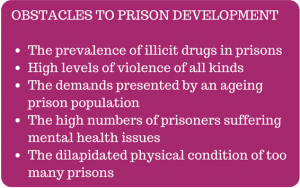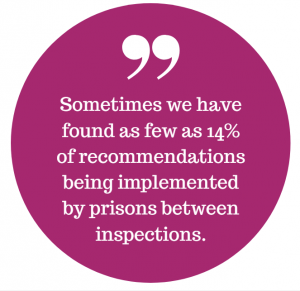In this exclusive interview we asked HMI Prisons Peter Clarke and HMI Probation Dame Glenys Stacey about the government's new integrated approach and the future of prisons and probation services…
What are the key benefits of integrated prison and probation services in reducing re-offending levels and prison usage?
HMI Prisons: It is widely accepted that family contact and support, sustainable accommodation on release from prison, and ongoing support from community based services are key factors in reducing the risk of re-offending. The process of ensuring that these factors are in place should start while prisoners are still serving their sentences. The earlier this can happen the better, but the quality of the outcomes delivered by integrated services is key. For instance, merely signposting a prisoner towards accommodation services is no substitute for actual help in securing accommodation. All too often we see the former rather than the latter.
What are prison and probation service priorities given the multiple challenges faced?
Of course, it is not for Chief Inspectors to set others’ priorities, but we can give a view.
HMI Prisons: From the perspective of HMI Prisons, the prison service needs to concentrate on achieving some basic operational objectives rather than focussing on organisational structures. Our view is that these fundamental issues will not be adequately addressed by structural change, but require determined, focussed leadership at all levels. The issues that are currently having a detrimental impact on the ability of prisons to deliver effective rehabilitation and resettlement are as follows:

When these basic issues are addressed, it will be possible to make meaningful progress towards building a rehabilitative culture.
HMI Probation: From the perspective of HMI probation, we encourage all probation providers to consider and work to the standards we expect. In recent months we have worked collaboratively with providers to develop those standards, and for us they represent a comprehensive statement of what good, effective probation services look like.
We know that this is easier said than done, especially when some probation providers are struggling to balance the books, and many are focused naturally and first and foremost on their contractual requirements. But the value chain for probation is clear enough: to deliver probation services well, providers need strong local partnerships, a good range of specialist services (Interventions) readily available, and good, effective relationships between individuals under supervision and their probation worker. By nurturing that value chain and applying the standards we have developed, probation providers are more likely to deliver effective probation services.
What impact do you think the devolution agenda will have on the future of prison and probation services?
HMI Prisons: Once the basic issues outlined above have been addressed it will be essential to determine the most appropriate structures to ensure that the changes are embedded and sustainable. The risk of taking an approach which believes that devolution will of itself deliver change is that the process of restructuring will absorb so much management focus and energy that the process will become introspective and less focused on the absolute need to address the basic requirements to deliver safe, decent and purposeful custody.
HMI Probation: that is a very interesting question. The answer rather depends on the government’s appetite for devolving responsibility and accountability for any aspect of probation service delivery to more localised authorities, such as city regions. I don’t see any immediate change on the horizon, but it could happen. Meanwhile, mayors are already working alongside probation providers and in some cases providing some funding for specific initiatives, for example in relation to women.
How do your organisations help drive improvement, and are you making a difference? If not then why not?
HMI Prisons: Unfortunately there has been a very clear trend over recent years for Inspectorate recommendations to be accepted by the prison service in greater numbers (as high as 85%), but to be implemented with ever decreasing regularity. Sometimes we have found as few as 14% of recommendations being implemented by prisons between inspections.
Sometimes there are issues that are beyond the control of local management that impact on the implementation of recommendations, but on many occasions it is the quality and focus of local leadership that is the key determinant of success or failure. The recent introduction of an ‘Urgent Notification’ protocol whereby the Secretary of State undertakes to respond with an action plan within 28 days when the Chief Inspector raises significant concerns about conditions at an establishment will, it is hoped, lead to improvements at the most concerning prisons.
More broadly, the prison service is undertaking to monitor more closely the implementation of Inspectorate recommendations. Time will tell how effective this will be.

HMI Probation: We know (from re-inspections) that an inspection and recommendations can drive improvement, but there is no guarantee. Inspectorates are not regulators; they do not have powers of sanction. To help drive improvement where it needed, and to be as effective as possible at that, HMI Probation is changing the way it inspects – moving to more regular (annual) inspections of whole CRCs and NPS divisions, looking at more cases so as to be confident in what we find, evaluating CRCs using the standards I mentioned earlier and – last but not least – rating each CRC and NPS division we inspect, using the Ofsted rating scale.
We know from the available research that ratings drive improvement in immature markets and where providers of services are delivering to a lower standard than expected, and so rating here seem very likely to drive improvement – even accepting the other pressures that probation providers face.

Evelyn Woodland
Experienced Marketing Manager with a history of working in the events industry. Marketing lead for Govnet Justice portfolio, Bachelor of Arts (BA) in Communication from Simon Fraser University.



